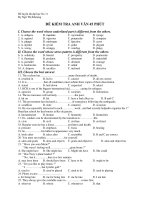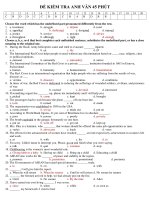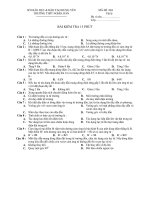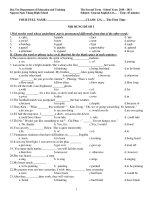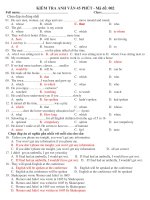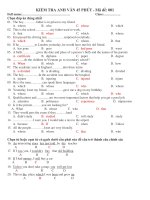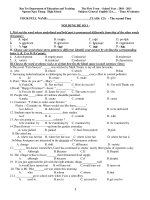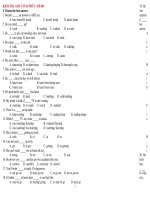KIỂM TRA ANH VĂN 45 PHÚT - Mã đề: 002 pps
Bạn đang xem bản rút gọn của tài liệu. Xem và tải ngay bản đầy đủ của tài liệu tại đây (121.7 KB, 5 trang )
KIỂM TRA ANH VĂN 45 PHÚT - Mã đề: 002
Full name:……………………………………… Class:…………….
Chọn đáp án đúng nhất
01. He sees men, women, cat, dogs and cars…………….move mound and round.
A. whose B. which C. that D. who.
02. The girl……… you spoke is my cousin
A. where B. when C. which D. to whom
03. They will do it better if they more time
A. have B. will have C. had D. are having
04. I can buy it I have enough money.
A. if B. because C. unless D. so
05. The man on the plane talked all the time.
A. who I was sitting next to B. all are correct C. that I was sitting next to D. whom I was sitting next to
06. My roommate, ………………parents used to work in a circus, can ride a horse
A. who B. of whom C. whom D. whose
07. If we had more teachers, classes…….smaller
A. would be B. will be C. were D. can be
08. He reads all the books………….he can borrow.
A. whom B. that C. which D. who
09. The town I was born and grew up
A. which B. in which C. when D. who
10. Do you enjoy cartoons?
A. watched B. watching C. to watch D. watch
11. He could have understood you if you slowly
A. spoke B. has spoken C. hadn't spoken D. had spoken
12. It rained all the time, ……………was a pity.
A. which B. that C. whom D. whose.
13. does the lower secondary education last? 4years
A. what B. How long C. which D. when
14. Schooling is for all English children from the age of 5 to 16
A. optional B. compulsory C. option D. not compulsory
15. He doesn’t smile at all. He seems to have no…….of humour
A. sense B. still C. feel D. taste
Chọn đáp án có nghĩa gần nhất với mỗi câu cho sẵn
16. Unless you phone me tonight, you won’t get any information.
A. You won’t get any information if you phone me.
B. If you don’t phone me tonight, you won’t get any information.
C. If you didn’t phone me tonight, you won’t get any information D. all are correct
17. I didn't get an umbrella, I got wet yesterday
A. If I had had an umbrella, I would get wet. B. If I had had an umbrella, I would have got wet.
C. If I had had an umbrella, I wouldn't have got wet. D. If I had had an umbrella, I wouldn't get wet.
18. They will speak English at the conference
A. English will be spoken at the conference B. English will be speaked at the conference
C. English at the conference will be spoken D. English at the conference will be speaked
19. Shakespeare wrote 'Romeo and Juliet' in 1605
A. 'Romeo and Juliet' was wrote in 1605 by Shakespeare
B. 'Romeo and Juliet' was writed in 1605 by Shakespeare
C. 'Romeo and Juliet' in 1605 was written by Shakespeare
D. 'Romeo and Juliet' was written in 1605 by Shakespeare
20. They are painting the kitchen now
A. The kitchen is painted now by them B. The kitchen is being painted now
C. The kitchen are being painted now D. The kitchen was being painted now
Chọn từ có phần gạch chân có cách phát âm khác với các từ còn lại
21. A. makes B. manages C. photographs D. laughs
22. A. faced B. mended C. waited D. invited
23. A. landed B. stared C. traveled D. fastened
Chọn từ có trọng âm chính nhấn vào âm tiết có vị trí khác với các từ còn lại
24. A. requirement B. admission C. decision D. maximum
25. A. accommodation B. graduation C. international D. understanding
Reading : Chọn đáp án đúng nhất
In 1988, for the first time in British history, a National Curriculum was introduced. The National
Curriculum tells pupils which subjects they have to study, what they must learn and when they have to take
assessment tests.
Between the ages of 14 and 16, pupils study for their GCSE (General Certificate of Secondary Education)
exams. Pupils must take English Language, Maths and Science for GCSE, as well as a half GCSE in a
foreign language and Technology. In addition, they must also be taught Physical Education, Religious
Education and Sex Education, although they do not take exams in these subjects.
At the age of 16, pupils can leave school. If pupils stay on, they usually. take A (Advanced) levels, AS
(Advanced Supplementary) level or GNVQs (Greater National Vocational Qualifications). It is quite
common to combine, for example, two A levels with one AS level, or one A level with one GNVQ.
Pupils taking A levels study traditional subjects, such as French, Physics or History. To go to university,
pupils usually need two or three A levels.
AS levels are the same standard as A levels, but only half of the content: AS level German pupils take the A-
level German language exam, but do not take the A-level German Literature exam.
GNVQs are vocational qualifications. Pupils usually take on GNVQ in subjects such as Business,
Leisure and Tourism, Manufacturing, and Art and Design. One GVNQ (at advanced level) is equal to two A
levels.
26. Britain began to have a National Curriculum ________________ .
A. one hundred years ago B. in the nineteenth century C. in 1898 D. in 1988
27. Which of the following subjects do British students NOT take exams in?
A. Science B. Physical Education C. Maths D. English Language
28. Pupils need _____________ A levels to continue to study at university.
A. one or two B. two or three C. four or five D. five or six
29. Which of the following subjects do pupils NOT take on GNVQ in?
A. German Literature B. Business C. Art and Design D. Manufacturing
30. Pupils normally study for their GCSE between the ages of ____________ .
A. 12 and 14 B. 14 and 16 C. 15 and 17 D. 16 and 18
Viềt lại các câu sau theo yêu cầu của từ trong ngoặc
31. The park has a lake in it. The park is near our house. (Relative clause)
32. The children who attend that school receive a good education . (Reduced clause).
33. They built that old red house in the year 1822 (passive voice)
34. They live in a house that was built in 1980 .(Reduced clause).
35. Mary has finished her exercises (passive voice)
Test 45' (N
0
02) mã đề: 52862359868
Full name:……………………………………… Class:…………….
Chọn đáp án đúng nhất
01. The man on the plane talked all the time.
A. all are correct B. whom I wa sitting next to C. that I was sitting next t D. who I was sitting next to
02. does the lower secondary education last? 4years
A. How long B. when C. which D. what
03. If we had more teachers, classes…….smaller
A. were B. can be C. will be D. would be
04. It rained all the time, ……………was a pity.
A. which B. whom C. whose. D. that
05. The girl……… you spoke is my cousin
A. which B. where C. to whom D. when
06. : He doesn’t smile at all. He seems to have no…….of humour
A. feel B. sense C. taste D. still
07. My roommate, ………………parents used to work in a circus, can ride a horse
A. whose B. who C. whom D. of whom
08. He could have understood you if you slowly
A. hadn't spoken B. spoke C. had spoken D. has spoken
09. He reads all the books………….he can borrow.
A. who B. that C. which D. whom
10. I can buy it I have enough money.
A. if B. so C. because D. unless
11. Schooling is for all English children from the age of 5 to 16
A. option B. compulsory C. optional D. not compulsory
12. The town I was born and grew up
A. who B. when C. in which D. which
13. Do you enjoy cartoons?
A. watching B. watch C. to watch D. watched
14. They will do it better if they more time
A. had B. have C. will have D. are having
15. He sees men, women, cat, dogs and cars…………….move mound and round.
A. who. B. which C. that D. whose
Chọn đáp án có nghĩa gần nhất với mỗi câu cho sẵn
16. Shakespeare wrote 'Romeo and Juliet' in 1605
A. 'Romeo and Juliet' was writed in 1605 by Shakespeare
B. 'Romeo and Juliet' was written in 1605 by Shakespeare
C. 'Romeo and Juliet' in 1605 was written by Shakespeare
D. 'Romeo and Juliet' was wrote in 1605 by Shakespeare
17. I didn't get an umbrella, I got wet yesterday
A. If I had had an umbrella, I would have got wet. B. If I had had an umbrella, I wouldn't get wet.
C. If I had had an umbrella, I would get wet. D. If I had had an umbrella, I wouldn't have got wet.
18. Unless you phone me tonight, you won’t get any information.
A. all are correct B. You won’t get any information if you phone me.
C. If you didn’t phone me tonight, you won’t get any information
D. If you don’t phone me tonight, you won’t get any information.
19. They will speak English at the conference
A. English will be spoken at the conference B. English will be speaked at the conference
C. English at the conference will be speaked D. English at the conference will be spoken
20. They are painting the kitchen now
A. The kitchen is painted now by them B. The kitchen was being painted now
C. The kitchen is being painted now D. The kitchen are being painted now
Chọn từ có phần gạch chân có cách phát âm khác với các từ còn lại
21. A. stared B. landed C. fastened D. traveled
22. A. invited B. faced C. waited D. mended
23. A. manages B. makes C. laughs D. photographs
Chọn từ có trọng âm chính nhấn vào âm tiết có vị trí khác với các từ còn lại
24. A. graduation B. understanding C. accommodation D. international
25. A. admission B. maximum C. decision D. requirement
Reading : Chọn đáp án đúng nhất
In 1988, for the first time in British history, a National Curriculum was introduced. The National
Curriculum tells pupils which subjects they have to study, what they must learn and when they have to take
assessment tests.
Between the ages of 14 and 16, pupils study for their GCSE (General Certificate of Secondary Education)
exams. Pupils must take English Language, Maths and Science for GCSE, as well as a half GCSE in a
foreign language and Technology. In addition, they must also be taught Physical Education, Religious
Education and Sex Education, although they do not take exams in these subjects.
At the age of 16, pupils can leave school. If pupils stay on, they usually. take A (Advanced) levels, AS
(Advanced Supplementary) level or GNVQs (Greater National Vocational Qualifications). It is quite
common to combine, for example, two A levels with one AS level, or one A level with one GNVQ.
Pupils taking A levels study traditional subjects, such as French, Physics or History. To go to university,
pupils usually need two or three A levels.
AS levels are the same standard as A levels, but only half of the content: AS level German pupils take the A-
level German language exam, but do not take the A-level German Literature exam.
GNVQs are vocational qualifications. Pupils usually take on GNVQ in subjects such as Business,
Leisure and Tourism, Manufacturing, and Art and Design. One GVNQ (at advanced level) is equal to two A
levels.
26. Britain began to have a National Curriculum ________________.
A. one hundred years ago B. in the nineteenth century C. in 1898 D. in 1988
27. Which of the following subjects do British students NOT take exams in?
A. Science B. Physical Education C. Maths D. English Language
28. Pupils need _____________ A levels to continue to study at university.
A. one or two B. two or three C. four or five D. five or six
29. Which of the following subjects do pupils NOT take on GNVQ in?
A. German Literature B. Business C. Art and Design D. Manufacturing
30. Pupils normally study for their GCSE between the ages of ____________ .
A. 12 and 14 B. 14 and 16 C. 15 and 17 D. 16 and 18
Viềt lại các câu sau theo yêu cầu của từ trong ngoặc
31. They live in a house that was built in 1980 .(Reduced clause).
32. The children who attend that school receive a good education . (Reduced clause).
33. They built that old red house in the year 1822 (passive voice)
34. Mary has finished her exercises (passive voice)
35. The park has a lake in it. The park is near our house. (Relative clause)
TN100 tổng hợp đáp án 2 đề
1. Đáp án đề: : 1010011001001101
01. - - } - 10. - | - - 19. - - - ~ 28.
02. - - - ~ 11. - - } - 20. - | - - 29.
03. { - - - 12. { - - - 21. - | - - 30.
04. { - - - 13. - | - - 22. { - - -
05. - | - - 14. - | - - 23. { - - -
06. - - - ~ 15. { - - - 24. - - - ~
07. { - - - 16. - | - - 25. { - - -
08. - | - - 17. - - } - 26.
09. - | - - 18. { - - - 27.
2. Đáp án đề: : 1011100100101101
01. { - - - 10. { - - - 19. { - - - 28.
02. { - - - 11. - | - - 20. - - } - 29.
03. - - - ~ 12. - - } - 21. - | - - 30.
04. { - - - 13. { - - - 22. - | - -
05. - - } - 14. - | - - 23. { - - -
06. - | - - 15. - - } - 24. - - } -
07. { - - - 16. - | - - 25. - | - -
08. { - - - 17. - - - ~ 26.
09. - | - - 18. - - - ~ 27.
